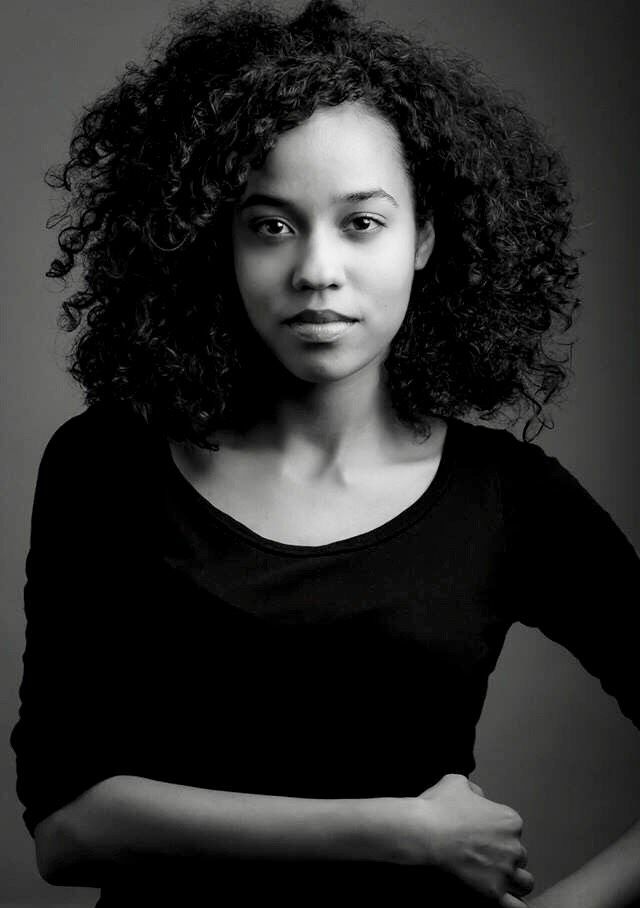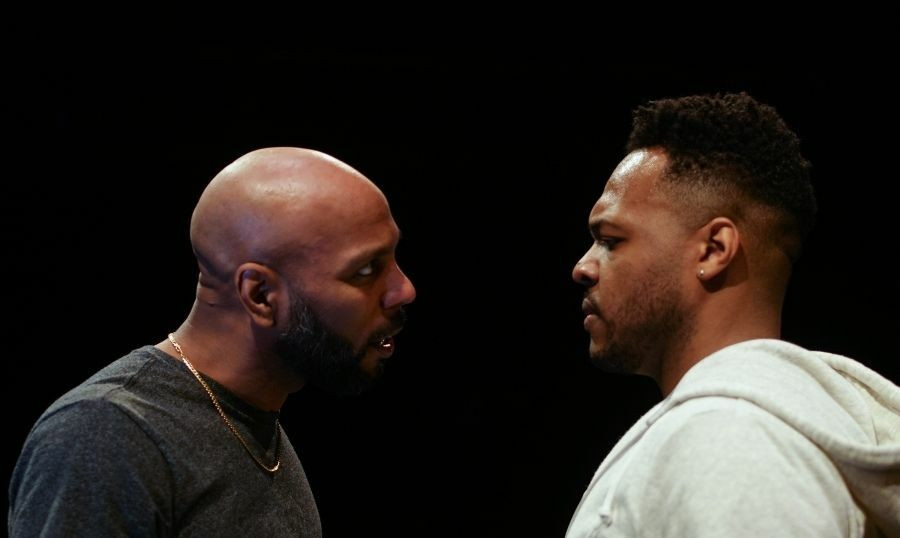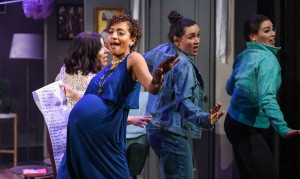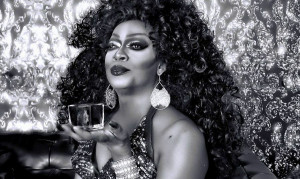One-liners jet by barely allowing time to digest: “Wakanda is not our ceiling” “I may not know my roots but I most definitely know my desire” “complacency is a conduit for slavery”. The play, which throws countless lacerating blows against racism was created by the soft-spoken and incidentally, heavily pregnant, Torontonian Natasha Adiyana Morris.
I can let my guard down. The show is up, I don’t have to think about notes and producing and putting out fires! I can just sit and watch and that’s my favourite part.
Morris is resting easy, shoes kicked off, fully ensconced in a rounded plastic chair in Theatre Passe Muraille’s greenroom. The Toronto west end theatre will be her virtual home for the next two weeks while her play, presented at Theatre Passe Muraille’s main stage, does it’s best to leave an indelible mark on theatregoers’ consciousness. The 33-year-old playwright and founder of Piece of Mine Arts theatre company is a picture of calm and quiet confidence, unlike her latest work which rings out loud and emphatic. The first iteration of the play stomped on to the theatre scene at Piece of Mine Arts Festival in 2015 at 20 minutes long. It won the Contra Guys Award for new performance text at SummerWorks Festival, 2018. The work has expanded through readings, alterations and international runs and is now a finely tuned eighty-minute clap back at anti-Black racism in Canada and abroad.
As I watch it I ask, where are we and where am I? We have to talk about internalized racism... We are congregating but are we working together?
Morris’ clever use of the children’s story The Little Red Hen, answers her semi- rhetorical question. The enterprising hen asks her farm animal friends for help planting and harvesting, only to be repeatedly turned down by all. When it came time to enjoy the fruits of her labor, the otherwise unengaged farm animals rushed in for the spoils but were decisively dismissed by the rather perturbed hen.
Like the red hen, Morris has little time for folks who are not willing to put in the work and contribute to the culture.
My upbringing is definitely woven deeply into the play. The Black experience as being bi-racial but raised by my Jamaican mother and my Jamaican dad who raised me from when I was 3 yrs old, informs who I am. My biological father was not as involved in my life and lived in the States when I was growing up. So, I lived in a Black family, there was no colorism, no, “she’s gonna get treated better because she’s lighter”, everyone was treated the same in my family and I really appreciated my dad for always uplifting Black women- you’ll see a ‘Hotep’ character in the play who somewhat represents my father.
What is it about expressing yourself through the written word that appeals to you so much?
If I feel like I can be transported and feel something real, that is what I want to convey. Too often we really want things to be packaged and perfect. There’s the punchline, here’s the formula, just copy and paste. Anything that can shake that up and make me pay attention and say, “oh! that came across authentically because I can feel it in my body”, I want to be a part of that.”
Some of the characters are speaking regular prose, regular dialogue, some parts are spoken word. We have a lot of movement. I don’t want to put restrictions on how the story is told or say, only 20% of it can be spoken word. This is how the character is coming to me and I’ll just go with that and I’ll just piece it together later (laugh).
I remember going to Sheridan mall (northwest Toronto) for toonie Tuesday to go see a movie. More than seeing the movie, it was the audience that I loved! Everybody’s talking back to the movie, I’d be talking to the screen too. I just had to create a play with that type of engagement.
Take a seat in the pew section and be prepared for an up-close and engaging experience. The game show sketch where contestants are queried with Afrocentric and at times biting questions- think a certain political leader with a past penchant for dark makeup as one of the answers, and the tenor of Morris’ humour begins to take form.
Any hesitation bringing this play to the stage?
 I thought no one would want to produce this show. I thought nobody would want to touch it. I wasn’t sure how far I alone could take the show if I was the only one to produce it. But I knew even if that were the case, I’m not gonna scale back on the words or deliveries, thankfully, I was proven wrong...
I thought no one would want to produce this show. I thought nobody would want to touch it. I wasn’t sure how far I alone could take the show if I was the only one to produce it. But I knew even if that were the case, I’m not gonna scale back on the words or deliveries, thankfully, I was proven wrong...
I really don’t want the work to feel offensive or make people go into a space they don’t want to be but I am surprised, the play has audiences all over who experienced it in different ways.”
What’s your hope for this work?
I chose theatre on purpose. The live quality is something you’ll never get again. You have a painting on your wall forever, you have a film that you can watch 18 million times but for theatre, you have to be there in the moment for that experience. I want the show to travel. I want to see actors interpret the play and see how it evolves. And then I can write more plays (laugh). This has been a huge learning curve as a director doing it in the round, not having a lot of technical background but I’ve learned a great deal and I’ve learned to lean on people who know their field like Troy DeFour, - a producer of Piece Of Mine Arts Festival- he’s been my everything for the mounting of this show.
Do you think Black folk are moving in the right direction when it comes to dealing with anti-Black racism?
I think it will continue to get better when you see more individuals and groups taking the initiative to fill the spaces and the lack thereof for what they want to see. I believe it is not as effective to ask, petition, wait, beg for something to be created for you. So, Piece of Mine Art, the art organization I founded, has been my catalyst to seeing the theatre I wanted to see. Through the time, energy and resources of b current Performing Arts and Africa Dub Theatre, people there made sure I was able to travel to see works by Black Canadian playwright/director Djanet Sears at Stratford Festival. We piled into a car and headed to Montreal to see The Trilogy at Black Theatre Workshop, thanks to these organizations which exist to foster African-Canadian artists I experienced art through a Black lens.
When you see the amount of work that goes into these works of art you realize you have to do more than is asked or that you feel you can do.
I’ve learned I’m not trying to compete with other theatre companies, I can build from where I’m at. It’s trial and error. You can’t rush it.
Are you satisfied with your career at this very moment?
Satisfied? Not satisfied in the least, but I can say I’m proud of where I’m at because I can see the progression.
The Negroes Are Congregating is playing at Theatre Passe Muraille through March 14 with a special BLACKOUT performance on March 5, 2020
Rosey Edeh spent a decade (2005-2015) bringing the latest entertainment and pop culture news to the masses as a senior reporter on Global TV’s ET Canada. Building on her vast experience as a news anchor and TV personality as seen on CNN, MSNBC and Global News, Rosey has founded an award-winning production company, Micha Muse Media Inc. Movies, plays, art exhibits, good books and all things track and field get this journalist, filmmaker and three-time Olympian excited for life. Human connection, struggle and triumph, maintain Rosey’s mission to tell meaningful and even entertaining stories that hopefully offer readers insight, depth and even a little levity.
Twitter: @roseyedeh

 By
By 





